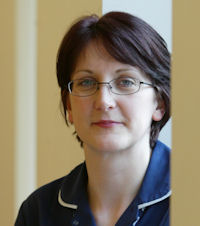
"People didn’t use to ask
what had happened to
their babies" - Lesley Allan
![]()
‘As a newly qualified staff nurse on a gynae ward, I was especially interested in the care that women experiencing pregnancy loss received. It seemed to me that ensuring that sensitive disposal of the pregnancy was offered to all women, regardless of the gestation of their pregnancy, was an important part of that care.
‘Although I felt like a lone voice, I went ahead and wrote a protocol for sensitive disposal and managed to negotiate with my management to offer it at all gestations.
‘I thought that was the end of the story, but then I was invited by the RCN Gynae Nurses Forum to join a committee charged with developing the first national guidelines on sensitive disposal, designed to address inconsistent practices around the UK.
‘Those guidelines were published in 2000, but after that came the real work of making sure they were implemented, and I worked with The Miscarriage Association to promote the guidelines at a series of special conferences for health professionals.
‘I am now involved in revising and updating the guidelines, working very closely with Ruth Bender Atik of The Miscarriage Association. Nurses look after women while they are miscarrying, but The M.A. has contact with them afterwards and we really need to know what women think and feel about their treatment.
‘I hope the work I have been involved with has empowered people to talk about issues previously seen as unmentionable. Now I want to make sure that practice keeps up to date.’
